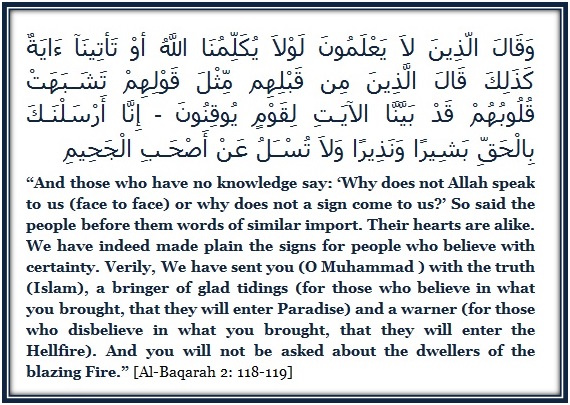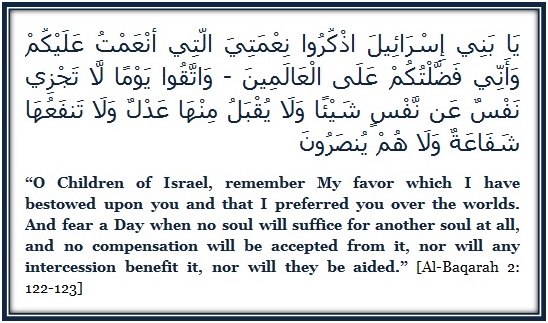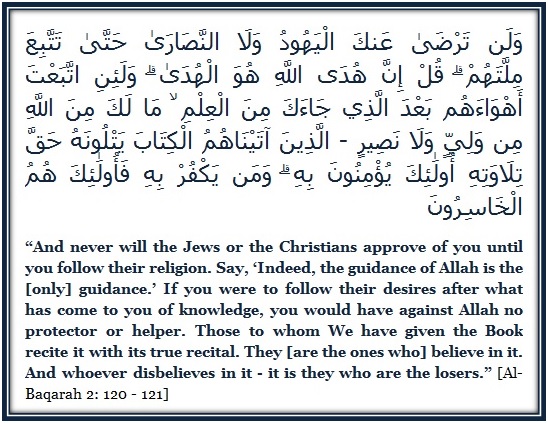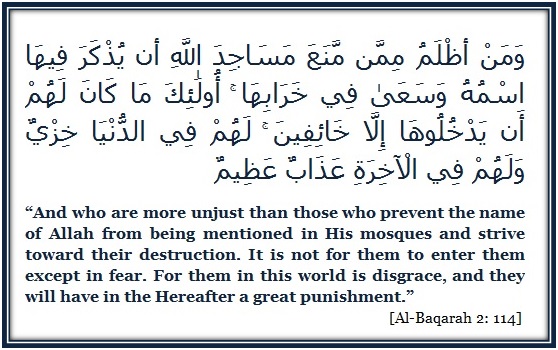Clear Signs for People who Believe
 |
| Surah Baqarah Verse 118-119 |
The disbelievers used to deny the prophethood of Muhammad salAllahu ‘alayhi wa sallam; some of them did so out of sheer malevolence. In order to feel triumphant in this obstinacy, they would make absurd and impossible demands, two of which have been mentioned here.
They insisted that Allah subhanahu wa ta’ala Himself should speak to them, either directly as He speaks to the angels, or through the angels as He speaks to the prophets. And that He should Himself proclaim his commands to them to make the intervention of a new prophet unnecessary. If not that then He should at least announce that He sent Muhammad salAllahu ‘alayhi wa sallam as a prophet, thus, making it easy for them to have faith in him and to follow his guidance. Should Allah subhanahu wa ta’ala choose not to accept this demand, they were ready with an alternative demand. They said then Allah subhanahu wa ta’ala should send them a sign or proof in confirmation of Muhammad’s salAllahu ‘alayhi wa sallam prophethood.
Muhammad bin Ishaq reported that Ibn ‘Abbas radhiAllahu ‘anhu said that Rafi’ bin Huraymilah said to the Messenger of Allah salAllahu ‘alayhi wa sallam, “O Muhammad! If you were truly a Messenger from Allah, as you claim, then ask Allah to speak to us directly, so that we hear His Speech.” So Allah subhanahu wa ta’ala revealed this ayah. Abu Al-‘Aliyah, Ar-Rabi’ bin Anas, Qatadah and As-Suddi are of the opinion that this was actually the statement of the Arab disbelievers. What further proves that the Arab polytheists said this statement is that Allah subhanahu wa ta’ala said in Surah Al-Anaam,
وَإِذَا جَآءَتْهُمْ ءَايَةٌ قَالُواْ لَن نُّؤْمِنَ حَتَّى نُؤْتَى مِثْلَ مَآ أُوتِىَ رُسُلُ اللَّهِ اللَّهُ أَعْلَمُ حَيْثُ يَجْعَلُ رِسَالَتَهُ سَيُصِيبُ الَّذِينَ أَجْرَمُواْ صَغَارٌ عِندَ اللَّهِ وَعَذَابٌ شَدِيدٌ بِمَا كَانُواْ يَمْكُرُونَ
“And when there comes to them a sign (from Allah) they say: ‘We shall not believe until we receive the like of that which the Messengers of Allah had received.’ Allah knows best with whom to place His Message. Humiliation and disgrace from Allah and a severe torment will overtake the criminals (polytheists and sinners) for that which they used to plot.” (6:124).
Some other examples can be seen in Al-Isra 17: 90 – 93, Al-Furqan 25: 21, and Al-Muddaththir 74: 52.
There are many other ayaat that testify to the disbelief of the Arab polytheists, their transgression, stubbornness, and that they asked unnecessary questions out of disbelief and arrogance. The statements of the Arab idolaters followed the statements of the nations of the People of the Two Scriptures and other religions before them. Allah subhanahu wa ta’ala said in Surah An-Nisa ayah 153,
يَسْأَلُكَ أَهْلُ الْكِتَـبِ أَن تُنَزِّلَ عَلَيْهِمْ كِتَـباً مِّنَ السَّمَآءِ فَقَدْ سَأَلُواْ مُوسَى أَكْبَرَ مِن ذلِكَ فَقَالُواْ أَرِنَا اللَّهِ جَهْرَةً
“The People of the Scripture (Jews) ask you to cause a book to descend upon them from heaven. Indeed, they asked Musa [Moses] for even greater than that, when they said: ‘Show us Allah in public.’” (4:153)
وَإِذْ قُلْتُمْ يَـمُوسَى لَن نُّؤْمِنَ لَكَ حَتَّى نَرَى اللَّهَ جَهْرَةً
“And (remember) when you said: ‘O Musa! We shall never believe in you until we see Allah plainly.’” (2:55)
By saying, “So said the people before them words of similar import,” Allah subhanahu wa ta’ala puts this demand down as being no more than a foolish custom which has all along been unthinkingly practiced by ignorant people even in the earlier ages.
LESSON:
This highlights an important point which is that the psychology of the people will remain alike no matter where on earth they might be or in what era they lived. The doubters will raise the same questions while the humble ones regardless of where they are, what color or what language will accept when truth becomes evident to them.
The ignorant ones judge other people and things on the basis of what is visible. For example, a person walking down the street in ordinary clothes is labeled as poor or middle-class. Another person passes by in Lamborghini and he is considered rich. In reality it could be that the person labeled poor or of a lower class is richer than the one driving Lamborghini. The one driving the car could be a car mechanic and is simply dropping the car at the owner’s house. He does not own the car. But we are a people who judge others and things on the surface. Many prophets and messengers were denied for the same reason. The people ascertained their prophethood on the basis of their financial or political standing. A Prophet of Allah knows that he is not sent in this world to gather wealth. He is sent with a purpose on which he must focus; fulfill his task and return to his Lord. The lords of Quraysh denied the Prophet salAllahu ‘alayhi wa sallam for the same reason, and some other demanded that he (Prophet salAllahu ‘alayhi wa sallam) should share with them the treasures that Allah subhanahu wa ta’ala has given him.
This is a point that we should reflect on.
What is our opinion about other people?
How quickly do we judge them? And how do we judge them?
Do we only befriend the rich and the popular or the one who might not be as strong in worldly treasures, but God-consciousness?
The ayah, then traces the origin of this demand to a distortion of the heart, in respect of which all the ignorant people, past or present, are alike, hence the parrot-like repetition of the same demand throughout the ages. He says, “Their hearts are alike.” It means that the hearts of the Arab polytheists are just like the hearts of those before them, containing disbelief, stubbornness and injustice.
Therefore, the first demand – the demand to speak with Allah subhanahu wa ta’ala face-to-face – was so inane that Allah subhanahu wa ta’ala does not even respond to it. As for the other demand, Allah subhanahu wa ta’ala reminds them that He has sent, not one, but a number of clear signs and proofs to confirm and establish the prophethood of Muhammad salAllahu ‘alayhi wa sallam. These signs and proofs, however, can be of help only to those who sincerely wish to know the truth and to attain certitude, as stated in the ayah, “We have indeed made plain the signs for people who believe with certainty.” As for those who are not in search of the truth, but enjoy being stuck in their malice and obstinacy, there is no help for them.
At this point, we had better say a word to resolve a difficulty that is likely to arise. The Jews and the Christians were ‘the People of the Book,’ and some of them were men of learning, and yet Allah calls them ignorant. Why? The reason is that although Allah subhanahu wa ta’ala had sent such a large number of clear signs and definite proofs to establish the prophethood of Muhammad salAllahu ‘alayhi wa sallam, yet they persisted in their denial. This is the mentality and the conduct of the ignorant.
LESSON:
Therefore, while being the students of the Qur’an we should never consider ourselves the guided ones. We should keep asking Allah subhanahu wa ta’ala for a humble heart and a heart that understands the true meanings of His Message. We should comprehend the Book as He intended it to be and not go for our own interpretations.
Ayah 119
In the next ayah Allah subhanahu wa ta’ala shares the purpose of sending the Prophet salAllahu ‘alayhi wa sallam: “Verily, We have sent you with the truth, a bringer of glad tidings and a warner. And you will not be asked about the dwellers of the blazing Fire.”
The Prophet salAllahu ‘alayhi wa sallam was sent bearing the truth and the genuine faith. His function was twofold — to give glad tidings to those who accept the truth, and warnings of dire punishment to those who deny.
Allah subhanahu wa ta’ala assures him that he will not be held responsible or taken to account for those who willingly pursue the way to Hell. All that he is required to do is to keep performing his own function, and not to worry as to who accepts the truth and who does not. A similar statement was said in Surah Ar-Rad ayah 40:
فَإِنَّمَا عَلَيْكَ الْبَلَـغُ وَعَلَيْنَا الْحِسَابُ
“Your duty is only to convey (the Message) and on Us is the reckoning.” (13:40)
LESSON:
This was the purpose of sending a messenger – to give glad tidings and to warn people. He was not sent as a magician to put up a show whenever people demanded some miracle. Neither did he seek comforts of this world nor did he leave behind any wealth. We too should focus on the purpose of our creation and keep our limited time in the mind. We are not here forever. Are we fulfilling our purpose?
True richness is the richness of emaan [faith] and taqwa [God-consciousness]. If one is deprived of either of the two then he is poor not rich. Worldly delights are perishable.
We also learn two etiquette of da’wah [calling people]. First, we must neither scare people by only talking about the Judgment Day and torments of the Hellfire, nor should we delude them with the pleasures of Paradise. It is because nothing is certain. No one knows where they will end up. Therefore, we should maintain a balance. We must have hope of Paradise but at the same time be fearful of Hellfire. We should not assume that by being Muslims we are guaranteed Paradise. No, we have to work for it!
Second etiquette is that we should understand our responsibilities as callers toward Allah subhanahu wa ta’ala. We are not responsible for who accepts the truth and who does not. We cannot (and should not) force people to believe in what we believe. Our responsibility ends at delivering the message. We should neither harm nor humiliate people if they do not listen to us. Reflect on the character of Muhammad salAllahu ‘alayhi wa sallam. He did not force anyone and he was the most patient.
May Allah subhanahu wa ta’ala allow us to value that which is truly precious (emaan and taqwa and not perishable delights), and may He teach us the adaab [etiquette] of da’wah ameen.
The Description of the Prophet salAllahu ‘alayhi wa sallam in the Torah
Imam Ahmad recorded ‘Ata’ bin Yasar saying that he met ‘Abdullah bin ‘Amr bin Al-‘Aas and said to him, “Tell me about the description of the Messenger of Allah in the Torah?” He said, “Yes, by Allah, he is described by the Torah with the same characteristics that he is described with in the Qur’an.”
In the Torah it appears:
“O Prophet! We have sent you as a witness, a bringer of good news, a warner, and as safe refuge for the unlettered people. You are My servant and Messenger. I have called you the Mutawakkil [who depends and relies on Allah for each and everything].
You are not harsh, nor hard, nor obnoxious in the bazaars. He does not reward the evil deed with an evil deed. Rather, he forgives and pardons.
Allah will not bring his life to an end, until he straightens the wicked’s religion by his hands so that the people proclaim: There is no deity worthy of worship except Allah. By his hands, Allah will open blind eyes, deaf ears and sealed hearts.”
[This was recorded by Al-Bukhari only.]
Read the Prophet’s description one more time. He was neither harsh nor obnoxious. He repelled evil, forgave and pardoned. Are we like this?

















